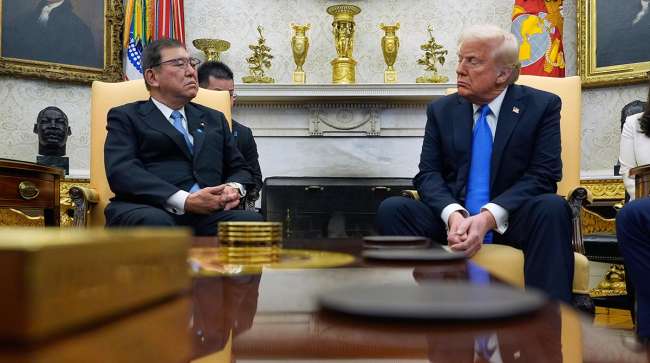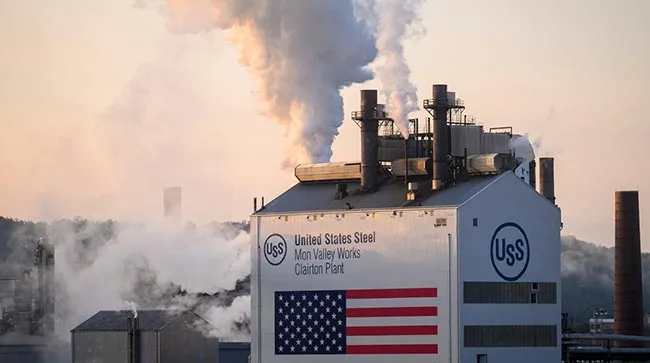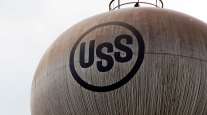Trump Says Nippon Steel May Invest in US Steel

[Stay on top of transportation news: Get TTNews in your inbox.]
U.S. President Donald Trump indicated Nippon Steel Corp. is considering investing in United States Steel Corp. instead of an outright purchase, offering a potential resolution to a clash over the Japanese firm’s contentious bid to buy the iconic American company.
Trump actually referenced automaker Nissan Motor Co. Ltd. repeatedly as the interested party in his Feb. 7 comments, though a person familiar with the president’s thinking confirmed he was referring to Nippon Steel.
“Nissan is going to be doing something very exciting about U.S. Steel, will be looking at an investment rather than a purchase,” Trump said at a joint press conference with Japanese Prime Minister Shigeru Ishiba. “They’ve agreed to invest heavily in U.S. Steel as opposed to own it, and that sounds very exciting.”
The comments add to investor concerns that the merger agreement is effectively over, a significant development as many holders of U.S. Steel shares had been hoping Trump would have a change of heart and attempt to reverse his predecessor’s decision to block the deal. While the two companies are litigating the decision in court, it is widely believed that the cases are unlikely to save the deal.

Trump has downplayed the need to sell U.S. Steel. (Justin Merriman/Bloomberg News)
Trump’s comments came after he met with Ishiba, addressing Nippon Steel’s $14.1 billion offer for U.S. Steel that became a political flashpoint in the 2024 presidential election and rattled ties between the U.S. and Japan, two normally stalwart allies. Trump has been vocal about his opposition to a foreign takeover of U.S. Steel, even before he returned as president.
“U.S. Steel is a very important company to us, the greatest company in the world for 15 years, many years ago, 80 years ago,” Trump said. “We didn’t want to see that leave, and it wouldn’t actually leave, but the concept psychologically not good.”
Representatives for U.S. Steel and Nippon Steel weren’t immediately available for comment.
Former President Joe Biden formally blocked the deal in January after a national review panel deadlocked in its risk assessment, kicking the matter to his desk. Nippon Steel and U.S. Steel are challenging Biden’s decision in court.
Host Seth Clevenger and TT's Connor Wolf discuss CES 2025 and the emerging technologies that could push the trucking industry forward. Tune in above or by going to RoadSigns.ttnews.com.
Trump regularly vowed to block the deal during his campaign, saying he didn’t like the idea of selling an iconic American firm headquartered in a politically important state to a foreign buyer. Vice President JD Vance also opposed the deal, which saw Nippon Steel outbid Cleveland-Cliffs Inc., based in Ohio, the state he represented in the US Senate.
Since taking office, though, Trump had been more muted on the transaction, leading some of its proponents to see a path forward.
Trump has also downplayed the need to sell U.S. Steel, saying he plans on imposing tariffs that will support the domestic steel industry, though he has not said when — or at what rate — he would impose those trade levies.
Trump’s comments also followed his meeting with U.S. Steel CEO Dave Burritt on Feb. 6. Burritt has warned that blocking the sale would imperil thousands of jobs and raise questions about whether the company’s head office could remain in Pittsburgh, known as the Steel City, a place with long historical links to the industry.
Cleveland-Cliffs had signaled it’s still interested in U.S. Steel should the current deal formally collapse.
Want more news? Listen to today's daily briefing above or go here for more info
Proponents argue that the sale of U.S. Steel to a company from an allied country would help bring investment to the American firm’s aging mills, support a rebirth of the sector in the U.S. and create a powerhouse with the scale to compete with Chinese counterparts.
Critics say it would weaken union protections for steelworkers, potentially open the U.S. to a flood of foreign-made steel and weaken the efficacy of trade actions to bolster the rest of the industry.
Written by Josh Wingrove, Jenny Leonard, Jennifer A. Dlouhy and Joe Deaux





